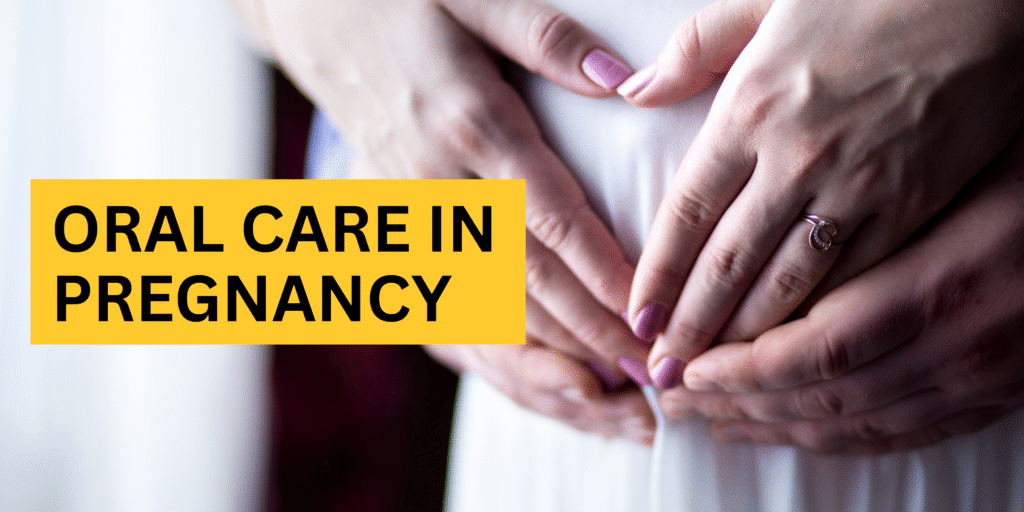Pregnancy is a beautiful journey filled with excitement and changes—both physical and emotional. While most women focus on prenatal checkups and nutrition, oral health during pregnancy often gets overlooked. However, hormonal changes can make gums more sensitive and increase the risk of dental problems like gingivitis, cavities, or even premature birth in severe cases.
Good oral care not only keeps the mother healthy but also supports the baby’s development. Here’s a comprehensive guide on how to take care of your teeth and gums during pregnancy.
- Maintain Regular Brushing & Flossing
Brushing twice a day with a fluoride toothpaste and flossing once daily is the foundation of good oral hygiene. During pregnancy, hormonal changes can make gums more prone to swelling and bleeding, so consistency becomes even more important. Use a soft-bristled toothbrush to clean gently but effectively.
- Prevent Pregnancy Gingivitis
Pregnancy hormones increase blood flow to the gums, making them more sensitive to plaque buildup. This can lead to pregnancy gingivitis, characterized by red, swollen, or bleeding gums. Regular brushing, flossing, and professional cleaning help reduce these risks and keep your gums healthy throughout pregnancy.
- Schedule Regular Dental Check-ups
Contrary to popular belief, dental check-ups are safe during pregnancy. Routine cleanings and exams can be done at any stage, and they are crucial for preventing or managing issues before they become severe. Always let your dentist know you’re expecting, so they can adjust care accordingly.
- Best Timing for Dental Treatments
If you require dental procedures beyond routine cleaning, the second trimester is generally considered the safest time. By this stage, your baby’s organs are developed, and you are usually more comfortable compared to the first or third trimester. Urgent treatments, however, should never be delayed regardless of the stage.
- Inform Your Dentist About Your Pregnancy
Always inform your dentist if you’re pregnant, planning to become pregnant, or breastfeeding. This helps them decide on the safest treatment options, medications, or anesthesia if needed. Certain drugs and procedures are best avoided, so open communication is key.
- Be Cautious with X-Rays
Routine dental X-rays are generally avoided during pregnancy unless absolutely necessary for urgent care. If an X-ray cannot be postponed, dentists use protective lead aprons and thyroid shields to minimize exposure, ensuring maximum safety for both mother and baby.
- Eat a Balanced, Healthy Diet
Your diet during pregnancy not only nourishes you but also supports your baby’s teeth and bone development. Limit sugary snacks and drinks that increase cavity risk. Instead, include calcium-rich foods (milk, yogurt, cheese) and vitamins like D and C from leafy greens, citrus fruits, and nuts to promote strong teeth and gums.
- Manage Morning Sickness Wisely
Frequent vomiting due to morning sickness exposes teeth to stomach acids, which can erode enamel. Instead of brushing immediately after vomiting (which can damage softened enamel), rinse your mouth with water or a mild baking soda solution first. Wait 20–30 minutes before brushing to protect your enamel.
- Stay Hydrated to Prevent Dry Mouth
Pregnant women often experience dry mouth due to hormonal changes. This condition increases the risk of tooth decay and gum disease. Drinking plenty of water, chewing sugar-free gum, and maintaining good hydration can help keep your mouth moist and healthy.
- Don’t Forget Postpartum Oral Care
Oral care doesn’t end with pregnancy. Gum problems may persist if neglected during these months. Continue your brushing, flossing, and dental visits after delivery. Maintaining strong oral health postpartum also sets a great example when caring for your child’s dental hygiene.
Why Oral Care During Pregnancy Matters
Reduces the risk of gum disease and cavities.
Prevents complications that could affect pregnancy, such as premature birth or low birth weight (linked to severe gum disease).
Supports the baby’s healthy teeth and bone development.
Keeps the mother comfortable and confident throughout pregnancy.
Final Thoughts
Pregnancy is the perfect time to prioritize not just your health but also your oral hygiene. By brushing, flossing, visiting your dentist regularly, and following a balanced diet, you can prevent dental issues and ensure a healthy smile for yourself and your baby.
If you are expecting, don’t ignore your dental health—schedule a check-up with your dentist today and take one more step towards a safe and happy pregnancy.

